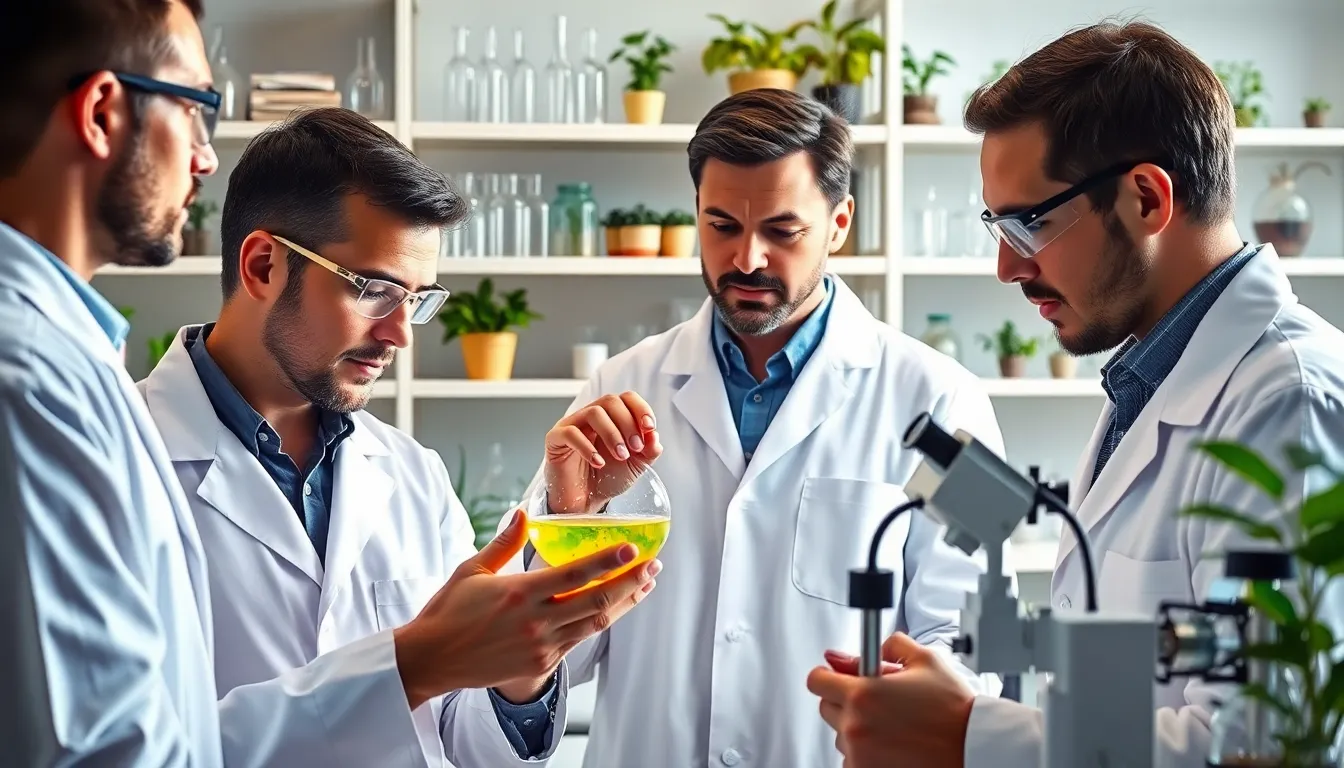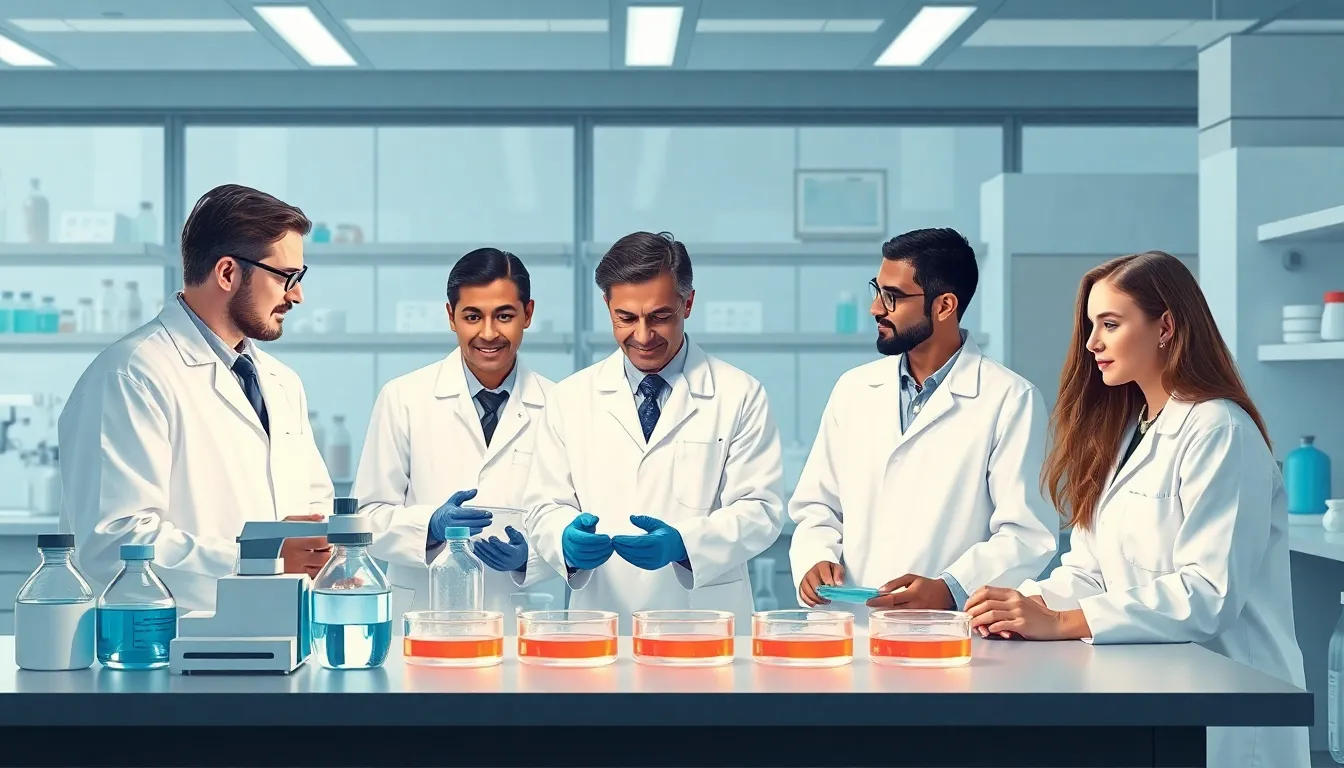Table of Contents
ToggleIn the land of innovation and opportunity, biotech USA stands as a beacon of cutting-edge science and entrepreneurial spirit. With a mix of lab coats and big dreams, this industry is transforming everything from healthcare to agriculture. It’s where scientists and entrepreneurs join forces to tackle some of the world’s biggest challenges, often with a dash of humor and a side of caffeine.
Imagine a world where diseases are tackled before they even think about knocking on your door. That’s the promise of biotech. As it pushes boundaries and redefines possibilities, biotech USA isn’t just about serious science; it’s about making life better, one breakthrough at a time. Whether you’re a seasoned expert or just curious about the buzz, this article dives into the vibrant landscape of biotech in the USA, where the future is not just bright—it’s downright dazzling.
Overview Of Biotech USA
Biotech USA represents a thriving sector within the biotechnology industry, focusing on innovative solutions to improve health outcomes. It encompasses various fields, including pharmaceuticals, agricultural biotech, and medical devices. Key regions for biotech advancements include Massachusetts, California, and Maryland, where numerous startups and established companies collaborate.
Biotech firms in the USA invest significantly in research and development (R&D). In 2022, stakeholders allocated approximately $20 billion to R&D efforts in the biotech space. These investments target therapeutic innovations, precision medicine, and genetic engineering. Companies leverage cutting-edge technologies, such as CRISPR and artificial intelligence, to enhance their product pipelines and streamline clinical trials.
Collaboration between academia and industry enhances the biotech ecosystem. Universities actively participate in research, providing critical findings that drive innovation. Institutions like MIT and Stanford engage in partnerships with biotech companies, turning scientific discoveries into marketable solutions.
Regulatory frameworks, primarily overseen by the Food and Drug Administration (FDA), ensure safety and efficacy for biotech products. Approval processes can vary, but the average time for new drug approvals ranges from 10 to 15 years, depending on product complexity. These regulations establish rigorous standards that biotech companies must meet while developing new therapies.
The workforce in Biotech USA combines a diverse array of skill sets. Biochemists, geneticists, and data analysts are among the essential roles contributing to advancements. As of 2023, the biotechnology sector employs over 300,000 professionals, showcasing its importance in the American economy.
Biotech USA’s role in addressing global health issues is pivotal. Ongoing efforts highlight the industry’s commitment to developing vaccines, therapies, and diagnostics that respond to emerging health threats, including pandemics and chronic diseases. Through innovation and collaboration, Biotech USA continues to shape the future of health and agriculture, making profound impacts on society.
Key Biotech Industries In The USA


The biotech industry in the USA encompasses several key sectors that drive innovation and development. Each sector plays a vital role in enhancing human health, agricultural practices, and environmental sustainability.
Pharmaceutical Biotech
Pharmaceutical biotech focuses on developing new drugs and therapies using biological processes and products. This sector utilizes advanced techniques such as monoclonal antibodies, recombinant DNA technology, and gene therapy. Major players include companies like Amgen, Gilead Sciences, and Genentech, which specialize in treatments for diseases like cancer, autoimmune disorders, and genetic conditions. In 2022, the pharmaceutical biotech industry attracted over $15 billion in investments for research and development, highlighting its essential role in healthcare.
Agricultural Biotech
Agricultural biotech aims to improve crop yields, enhance nutritional content, and increase pest resistance using biotechnology. By employing genetic engineering, significant advancements are made in developing genetically modified organisms (GMOs). Leaders in this field, such as Monsanto and Syngenta, contribute to sustainable farming practices. In the USA, about 93% of soybeans and 90% of corn planted in 2022 consisted of genetically modified varieties, showcasing the industry’s impact on food production and security.
Environmental Biotech
Environmental biotech addresses ecological challenges through the use of biological processes to reduce pollution, manage waste, and restore ecosystems. Techniques like bioremediation and bioaugmentation help clean contaminated soil and water. Companies such as BioAmber and Genomatica focus on sustainable production methods that minimize environmental footprints. The environmental biotech market is expected to reach approximately $44 billion by 2025, reflecting its growing importance in combating climate change and promoting sustainability.
Major Biotech Hubs In The USA
The USA hosts several key biotech hubs that drive innovation and collaboration across the industry.
Boston
Boston stands at the forefront of biotech innovation, housing over 1,000 companies and startups. The area excels due to strong partnerships between institutions such as Harvard University and the Massachusetts Institute of Technology (MIT). In 2022, Boston’s biotech sector attracted roughly $9 billion in venture capital investment, particularly in areas like gene therapy and immunotherapy. Resources include access to state-of-the-art research facilities and extensive talent pools that fuel ongoing development. Events like the BIO International Convention further enhance networking opportunities within the region.
San Francisco
San Francisco, often viewed as the heart of Silicon Valley, also excels in biotech advancements. The Bay Area boasts over 300 biotech firms, leveraging its proximity to renowned institutions like Stanford University and UC San Francisco. In 2022, investments in the region reached $7 billion, focusing on precision medicine and digital health solutions. The collaboration between tech and biotech sectors fosters groundbreaking innovations, driving significant advancements in healthcare. Initiatives such as the BayBio community provide vital support for entrepreneurs and researchers alike.
San Diego
San Diego ranks among the leading biotech hubs, with over 1,000 companies specializing in various sectors, including pharmaceuticals and environmental biotech. In 2022, the region’s biotech initiatives garnered approximately $6 billion in funding, emphasizing drug development and personalized medicine. Institutions like the Scripps Research Institute and UC San Diego contribute to a robust knowledge base. Networking organizations and industry events attract professionals eager to explore new technologies and market opportunities, solidifying San Diego’s status in the biotech landscape.
Challenges Facing Biotech USA
Biotech USA faces several significant challenges that can hinder its growth and innovation.
Regulatory Hurdles
Regulatory hurdles present major obstacles for biotech companies. The Food and Drug Administration (FDA) oversees the approval process for new drugs and therapies, which typically spans 10 to 15 years. The stringent requirements for safety, efficacy, and manufacturing can slow down product development. Companies often invest substantial resources in navigating complex regulatory frameworks and compliance issues. Sometimes, this results in delays that discourage investment and stifle innovation. Failure to meet regulatory standards can lead to costly repercussions, including lost funding and market opportunities.
Funding Limitations
Funding limitations critically affect the biotech industry’s ability to innovate. In 2022, overall investments in biotech R&D reached approximately $20 billion, yet securing venture capital remains competitive and challenging. Many startups struggle to attract early-stage funding, particularly in high-risk markets. Economic fluctuations can also impact investor confidence, leading to reduced funds available for research. Access to grants and public funding varies, creating additional barriers for emerging companies. This financial uncertainty can limit the ability of biotech firms to pursue groundbreaking projects and technologies.
Future Trends In Biotech USA
Biotech USA is poised for transformative advancements across multiple sectors. Emerging technologies such as CRISPR, artificial intelligence, and machine learning continue to revolutionize research and product development processes. Companies increasingly harness these tools to streamline drug discovery, enhance clinical trials, and increase the efficiency of production.
Personalized medicine trends emphasize tailored therapies based on genetic profiling, allowing treatments to become more effective and specific. Investments in this area reached approximately $6 billion in 2022, indicating strong future growth potential. Biotech firms prioritize patient-centric approaches, focusing on individual genetic makeups to optimize treatment efficacy.
Sustainable practices are gaining traction in agricultural biotech. Companies aim to develop crops that require fewer resources, such as water and pesticides, contributing to environmental conservation. The market for sustainable agricultural solutions is projected to expand significantly, with over 30% growth anticipated by 2030.
Digital health integration expands within the biotech sector, driven by advancements in telemedicine and health data analytics. The incorporation of wearable technology allows for better health monitoring and timely intervention, significantly impacting patient outcomes. Firms are increasingly investing in developing robust digital platforms, targeting $10 billion in investments by 2025.
Regulatory trends may shift as the FDA adapts to rapid advancements. There is a move towards more streamlined approval processes for breakthrough therapies, potentially reducing the time needed for products to enter the market. Such changes could enhance innovation and attract further investments.
The collaboration between biotech companies and healthcare providers is critical for future success. Joint efforts aim to enhance efficacy and speed in developing solutions addressing public health concerns. This focus on strategic partnerships signals a commitment to tackling major health challenges, paving the way for improved healthcare outcomes.







